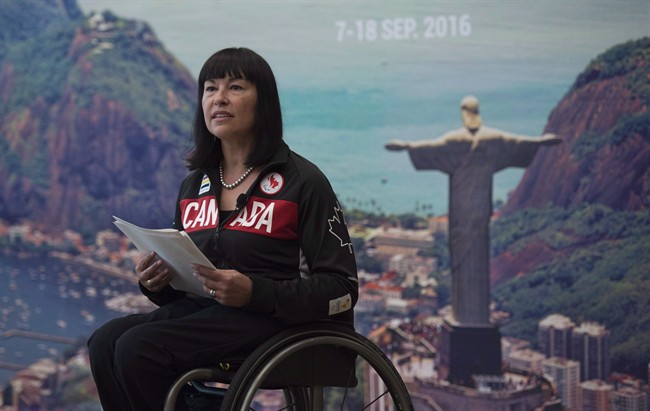RIO DE JANEIRO – When Chantal Petitclerc competed at the 1992 Paralympics in Barcelona, her wheelchair races went directly to finals.

There weren’t enough athletes to require heats.
The Paralympic movement has gathered steam in the more than two decades since, making for deeper fields across the board. But it’s a double-edged sword. Canada, once a world power in Paralympics, has slipped down the medal table.
READ MORE: Wheelchair basketball player David Eng named Canada’s Paralympics flag-bearer
“We were leaders and dominant for the longest time, and what happened was the world caught up,” said Petitclerc, Canada’s chef de mission at the Rio Paralympics.
Canada’s goal at the Games, which open Wednesday at Brazil’s storied Maracana Stadium, is a top-16 finish in overall medals. It would be a small increase over the 20th-place finish, with 31 medals, from four years ago in London, but would still be way off the riches Canada enjoyed in years past.
The London Paralympics marked the low point for Canada, which had only twice before slipped below the top-10 on the medal table in a summer Games. Canada finished third both in 2000 in Sydney, with a whopping 96 medals, and 2004 in Athens, before dropping to seventh in 2008 in Beijing.
READ MORE: Canada’s Aurelie Rivard entering Rio Paralympics as swimmer to beat
Petitclerc said it’s a combination of teams catching up and Canada rebuilding.
- Posters promoting ‘Steal From Loblaws Day’ are circulating. How did we get here?
- Video shows Ontario police sharing Trudeau’s location with protester, investigation launched
- Canadian food banks are on the brink: ‘This is not a sustainable situation’
- Solar eclipse eye damage: More than 160 cases reported in Ontario, Quebec
“If we go from 20th to 16th — I like round numbers, so I’d be happy with 15th — it means we are on the right track, it means that we’re going back to our place of being back on top in high performance, but also we’re taking care of who’s coming up,” she said.
“We are in this phase where we are rebuilding the team. . . my prediction is that we’ll go back to being the strong nation that we want to be, and we were, in two Games (in 2020 in Tokyo).”

Petitclerc, who won 21 Paralympic medals — 14 of them gold — over her illustrious wheelchair racing career, can’t argue with the world catching up.
“It’s really good, because what it means is the depth of the sport, and the level of difficulty needed to win a medal, is so much tougher than when I started,” she said.
“It’s great because athletes who win a medal here, in sports that in the past did not have a reputation of having a lot of depth, they can have this medal and go back home and feel proud that it compares to an Olympic medal.
“And athletes, they like it, they’re competitive so they want to compete against the best, and they want the best to be many.”
WATCH: Rio 2016: Brazil uses public money to fix Paralympic funding shortfall

The curtain came down on the Olympics two weeks ago in Rio, where Canada captured 22 medals to achieve its goal of a top-12 finish. Young stars such as sprinter Andre De Grasse and swimmer Penny Oleksiak became household names with their inspiring performances.
With the curtain about to come up on the Paralympics, Petitclerc said inspiring Canada’s youth is paramount.
“The level of inspiration that Canadians and kids with disability or older people with disability can get from our athletes and the Paralympic Games is amazing. . . It inspires because it proves that it can be done,” said Petitclerc, who was injured as a young girl when a barn door fell and crushed her spine.
“That always touches me. It’s tough for a parent of a child with disabilities, because you want them to push their limits and you want them to believe anything is possible. So they can see the Paralympic Games with all the disabilities. You’ve got visually impaired people on a bike going 100 kilometres an hour. It’s a very, very powerful human message.”
For a few nerve-wracking days last month, it sounded like that powerful human message might not get delivered.
WATCH: B.C. Paralympic athletes get ready to fly to Rio

Olympic organizers were harshly criticized for running out of money, leaving the Paralympics cash-strapped and some countries, who depended on grants, in doubt of making the trip.
Just 12 per cent of tickets had been sold before the #FillTheSeats campaign, a drive launched two weeks ago to buy and donate tickets to young people. British band Coldplay and Prince Harry were among those who donated.
Organizers say tickets sales have jumped from around 200,000 to 1.6 million.
Petitclerc said she was more concerned than worried about the Games, “because I care about that team and I want them to have the best performance environment.”
“But when we got here in the village, what we realized is: for sure there are challenges, but my very personal point of view is that a person, a city, a country can offer what they have to offer, with all their generosity. And that’s what Rio is doing right now. And what we say is thank you.
“And all the little hiccups, athletes are feeling good, they don’t care if the painting is perfect on the wall. The food’s good, the transport is good, and the venues are great. That’s all they want to know.”
Canada has 162 athletes competing in 19 sports, including two new ones: para-triathlon and para-canoe.



Comments